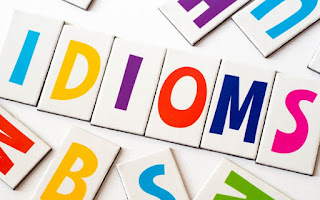Idioms
IDIOMS
Idioms are a type of figurative language, which means they are not always meant to be taken literally. Idioms express a particular sentiment, but they do not literally mean what the individual words themselves mean.
EXAMPLE OF IDIOM IN A SENTENCE:
- The grass is always greener on the other side.
This idiom does not literally mean that the “other side” will always have greener grass. There may not even be a literal “other side” to the subject at hand—or grass for that matter.
EXAMPLES OF IDIOMS:
- Beauty is in the eye of the beholder.
- Origin: The saying has existed for centuries in various forms; main creditor: Margaret Wolfe Hungerford, 1878
- Meaning: What looks beautiful to one person may not look beautiful to another.
- Don’t count your chickens before they hatch.
- Origin: Samuel Butler poem, 1663
- Meaning: Do not count on something before it has come to be.
- No crying over spilt milk.
- Origin: unknown
- Meaning: Do not be upset about something that cannot be changed. OR: Do not be upset about something that is really just a small matter.
- Curiosity killed the cat.
- Origin: proverb; Ben Jonson play, 1598
- Meaning: Being too curious or inquisitive can be dangerous.
- It’s raining cats and dogs.
- Origin: unknown
- Meaning: There is a heavy downpour.
- Back to the drawing board.
- Origin: possibly artist Peter Arno, 1941
- Meaning: Time to start over. We need to start from the beginning.
- The hay is in the barn.
- Origin: unknown
- Meaning: The action is complete. It is finished.
- A penny for your thoughts.
- Origin: perhaps English ruler Penda, c. 640
- Meaning: What are you thinking?
- Beat around the bush.
- Origin: Medieval Period
- Meaning: Someone is avoiding the topic.
- You can’t judge a book by its cover.
- Origin: mid-19th century
- Meaning: Do not assume you know someone or something by how he or it appears.
- That costs an arm and a leg.
- Origin: unknown
- Meaning: That is very expensive.
IMPORTANCE OF IDIOMS
Idioms cause your mind to shift from the reality of your situation to the abstract thought of the analogy or concept they reference. They keep your mind stimulated and focused. They provide an outlet for expressive communication and a way for different people to say the same thing but with different circumstantial allusions.




Comments
Post a Comment